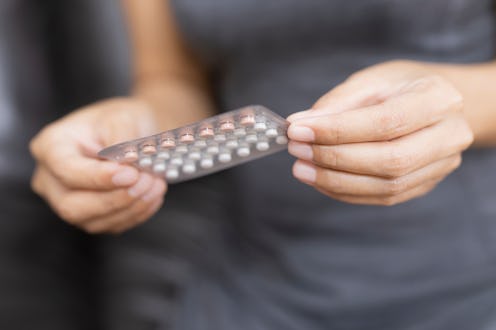Health
The Link Between Blood Clots & The Pill, Explained
Concerns around the AstraZeneca vaccine have prompted many to question the risk of taking a combined contraceptive. Here’s what you need to know.

After reports began to emerge that linked the AstraZeneca COVID-19 vaccine to an extremely rare but serious side effect, discussions around blood clots and what causes them has been taking place in the news and on social media. On Twitter, Instagram, and TikTok, users have questioned the concern about the AstraZeneca vaccine when there’s a much higher risk of blood clots for those taking the combined contraceptive pill. But what is the connection between the pill and blood clots, and what should those taking it know?
What Are Blood Clots & How Do They Form?
A blood clot is as it sounds: it is blood that has clumped together to form a semi-solid state. More often than not, clots are a safe and natural reaction from the body when you are injured as they prevent you from losing too much blood. However, occasionally the clots won’t dissolve on their own and this is when they pose a serious risk. If you demonstrate any signs of blood clots (outlined here by the NHS), you should contact your doctor, 111, or 999 immediately, depending on the circumstances.
The Link Between Blood Clots & The Contraceptive Pill
Why It Happens
The U.S. National Blood Clot Alliance (NBCA) explains that the connection between blood clots and the combined pill (which contains oestrogen and progesterone) is all to do with the body believing it’s pregnant.
Pills that contain oestrogen “cause the body to hormonally imitate pregnancy, or to think it’s pregnant,” writes the NBCA. During pregnancy, a person will “produce more clotting factor proteins” so that “their blood will clot more readily and protect them from any bleeding challenge that might occur with a miscarriage or during childbirth.”
For this reason, when birth control methods cause the body to think that it’s pregnant, “these same changes will occur, putting women at an increased risk for blood clots.”
The Stats
“Overall, the increased risk of blood clots with combined contraception is 5 to 12 per 10,000 pill users per year of use,” explains Dr. Kathryn Basford, a GP with Superdrug, “The risk is around three to three and a half times more than someone who is not using the pill.”
Dr. Simran Deo, an Online Doctor for Zava, breaks it down further, explaining that levonorgestrel-containing combined pills such as Microgynon or Rigevidon “are estimated to cause a blood clot in approximately 6 out of 10,000 users per year” whereas pills that contain drospirenone, gestodene or desogestrel (one example being Yasmin) will pose a risk for between 9 and 12 people in every 10,000 per year.
Statistics surrounding the progesterone-only pill (or mini-pill, as it’s sometimes known), though not inadmissible, present a significantly lower risk of causing a blood clots.
Factors including your smoker status, your age, your blood pressure, and you family’s medical history will have a bearing on your risk of blood clots and which hormonal contraception will be suitable for you.
Overall, Dr. Basford explains, “although the risks are higher for some pills than for others, the numbers are quite small, and some find that the pill that they're taking suits them better in terms of side effects than other lower-risk pills.”
What To Do If You Have Concerns About Blood Clots & The Pill
When you attend a contraception appointment, it’s likely your doctor will ask you a series of questions to assess your risk for conditions such as blood clots. Don’t be afraid to have an open discussion with your doctor and let them know if you are anxious in any way. They will hopefully be able to ease your concerns and suggest a number of different options. There’s no one size fits all when it comes to contraception and different methods run different risks. It’s all about finding the right balance of factors that works for you.
Dr. Deo echoes these sentiments, saying: “If you’re concerned that you may be at increased risk, always speak to your doctor who will determine whether you are on the correct pill or recommend a suitable option for you.”
She continues: “Often with contraception there is some degree of ‘trial and error’ to see which one suits you after it has been safely prescribed for you. This is because each individual can respond very differently to each medication, and over time, due to changes in our hormones, our own responses to contraceptive pills which may have previously suited us, may change.”
If you’re looking to do your own research at home, the following resources may prove useful:
- The NBCA’s Women & Blood Clots page
- The NHS’ contraception guide
- The Thrombosis UK website and their Thrombosis & Women fact sheet (venous thromboembolism, or VTE, is a condition in which blood clots form)
As mentioned above, if you demonstrate any signs of blood clots (outlined here by the NHS), you should contact the appropriate healthcare professional immediately.
Contributions from Alice Broster.
This article was originally published on